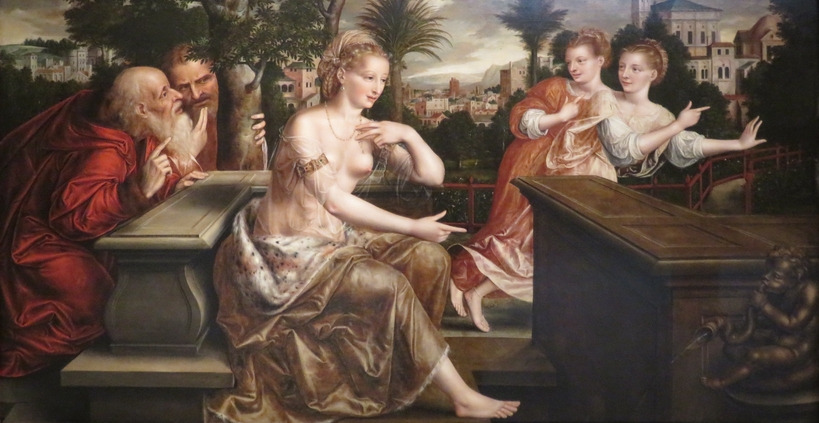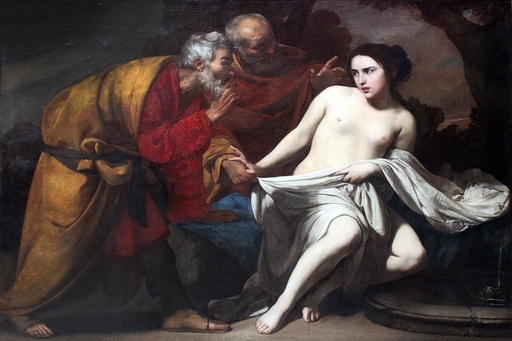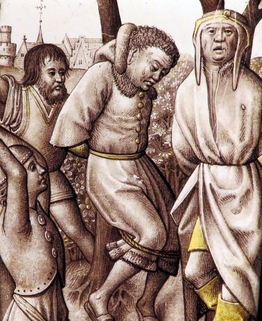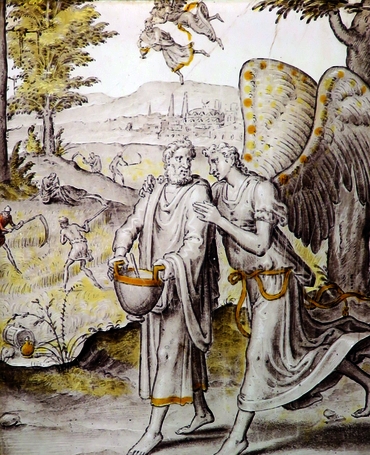
As soon as the maids were gone, the two elders jumped up, and ran to her.
Jan Massys, Flemish,1564
Content created: 2018-05-10
File last modified:
The house of Joachim is a community courthouse in the mornings, but in the afternoon, the privacy of the lovely garden provides a place for gracious repose and escape from the heat of the day.
[1] There dwelt a man in Babylon, called Joachim. [2] He took a wife, whose name was Susanna, who was the daughter of Chelkias. She was a very fair woman, who piously feared the Lord. [3] Her parents also were righteous, and taught their daughter according to the law of Moses.
[4] Joachim was a great, rich man, with a fine garden adjoining his house, which the Jews used it as a meeting place, and they had recourse to him because he was more respected than all other [Jews in Babylon].
[5] That year two of the elders of the people were appointed as judges. (The Lord [later] said of them, “Wickedness came from Babylon, from elders who were the judges, who were supposed to govern the people.”) [6] These men were constantly at Joachim's house, and all who had any law cases came to them [each morning].
[7] When the people went away at noon, Susanna would go into her husband's garden for a walk.
The two wicked elders, although appointed as judges, fall into sinful lust because of the great beauty of Susanna and spy upon her in her bath
[8] Each day the two elders saw her going into the garden and taking her walk, and their lust became inflamed toward her. [9] They each became obsessed, turning their eyes away from Heaven, and forgetting just judgments.
[10] Although both were filled with lust for her, they did not tell each other of their lovesickness, [11] for they were ashamed to declare their lust, and that they desired to seduce her. [12] Every day they watched diligently to see her.
[13] One day one elder said to the other, “Let us now go home, for it is lunch time.” [14] So when they went out, they separated to go their different ways. But both turned back again to the same place, and each asked the other what he was doing. And they acknowledged their lust, and they fixed a time, both together, when they might find her alone.
[15] One day, as they waited for the right day and time, she went into the garden as usual with two maids only, and she decided to bathe there, for it was hot. [16] There was nobody else there except the two elders, who were hiding and watching her. [17] Then she said to her maids, “Bring me olive oil and soap, and shut the garden doors, that I may wash myself.” [18] They did as she told them, and shutting the garden doors, they went out at the side door to fetch the things that she had asked for, unaware of the elders, since they were hiding. (Click here for note on soap.)

The two wicked elders seek to sleep with Susanna, and when she refuses, they falsely accuse her of having a lover, a mortal offense for a married woman.
[19] As soon as the maids were gone, the two elders jumped up, and ran to her, saying, [20] “Look! The garden doors are shut, so no one can see us. We are burning with desire. Consent and lie with us. [21] If you refuse, we will bear witness against you, that a young man was with you and that that is why you sent your maids away.”

[22] Then Susanna sighed, and said, “I am closed in on every side. If I consent to this thing, it will mean a death penalty for me; if I do not consent, I cannot escape from you. [23] It is better for me to fall into your hands, not consenting, than to sin in the sight of the Lord.”
[24] With that Susanna cried out with a loud voice, but the two elders also shouted. [25] One of them ran to open the garden door. [26] When the servants of the house heard the cries coming from the garden, they rushed in at the side door, to see what was happening to her.
[27] When the elders had told them their accusing story, the servants were greatly ashamed, for there never had been such a report made about Susanna.
A trial is held, and Susanna, accused by the two respectable elders, is condemned to death. She prays for God’s intervention.
[28] The next day, when the people were assembled at Joachim’s house, the two elders —the judges— came, full of their mischievous determination to have Susanna put to death.
[29] They said before the people, “Send for Susanna, the daughter of Chelkias, Joachim’s wife.” And so they sent for her. [30] She came with her father and mother, with her children, and with all her kinsmen.
[31] Now Susanna was a very delicate woman, and beauteous to behold. [32] She was veiled [in modesty], but these wicked men commanded her to uncover her face that they might be enjoy her beauty. [33] And at this her family and all who saw it wept.
[34] Then the two elders stood up in the midst of the people, and laid their hands upon her head. [35] Through her tears, she looked up toward heaven, for her heart trusted in the Lord.
[36] And the elders said, “As we were walking through the garden alone, this woman came in with two maids, and shut the garden doors, and sent the maids away. [37] Then a young man, who there was hiding there, came to her, and lay with her. [38] We were standing in a corner of the garden, and when we saw this wickedness, we ran over to them. [39] We saw them together, but we were not able to lay hold of the man, for he was stronger than we were, and he opened the door, and rushed out. [40] But we seized this woman, and we asked who the young man was, but she would not tell us. To all this we now testify.”
[41] The assembly believed them, since they were the elders and judges of the people, and they condemned her to death.
[42] Then Susanna cried out with a loud voice, and said, “Everlasting God, who knows all secrets and foresees all things, [43] you know that they have borne false witness against me, and now I must die; even though I never did such things as these evil men have invented against me.”
A noble youth named Daniel suddenly becomes agitated in spirit, and demands a new trial. His spunky interrogation of the two elders reveals their wicked conspiracy against Susanna. The crowd executes justice as, according to the law, the offenders must suffer the penalty for the crime of which they falsely accused Susanna.
[44] And the Lord heard her voice. [45] Therefore, as she was led away to be put to death, the Lord agitated the spirit of a devout youth, whose name was Daniel. [46] Daniel cried with a loud voice, “I cannot have the death of this woman upon my conscience.”
[47] Then all the people turned them toward him and asked, “What do you mean by these words?”
[48] Standing in the midst of them, he said, “Are you such fools, O sons of Israel, that without examination or evidence you would have condemned a daughter of Israel?! [49] Return to the place of judgment: for they have borne false witness against her.”
[50] So all the people turned back in haste, and the elders said to him, “Come, sit down among us, and explain to us, seeing God has given you the [temporary] status of an elder.
[51] Then Daniel said to them, “Separate these two far from each other, and I will examine them.”
[52] When they were put well separated, one from another, he called one of them, and said to him, “How evil you have become as you have aged! Now your past sins are all coming to light. [53] You have long pronounced false judgments; you have condemned the innocent and freed the guilty. And this even though the Lord commands that ‘The innocent and righteous you shall not slay.’ [54] Now then, if you saw her, tell me,: under what tree did you see them together?” “Under a [small] clove tree,” answered the elder.
[55] And Daniel said, “Clove? Very well. You have lied against your own head. Even now an angel has received the sentence from God to have you “cloven” in half.
[56] “With that, he moved him aside, and commanded them to bring the other, and said to him, “You seed of Canaan, and not of Judah! Beauty has deceived you, and lust has perverted your heart. [57] We know how you have dealt with the daughters of Israel, and that, through fear, they have given in to you. But a daughter of Judah would not abide your wickedness [and turned aside your advances]. [58] Now therefore tell me: Under what tree did you see them take them their pleasure together?” “Under a [large] yew tree,” answered the second elder.

[59] Then Daniel said to him, “Yew? Very well. You have also lied against your own head. And even now an angel of God awaits with the sword to “hew” you in half, that he may destroy both of you.” (Click here for note about puns.)
[60] With that, all the assembly cried out with a loud voice, and praised God, who saves those who trust in him. [61] And they arose against the two elders, for Daniel had caused them to be convicted of false witness by their own words. [62] And according to the law of Moses the assembly did to them what they had maliciously intended to do to their neighbors: they put them to death [by stoning]. Thus the innocent blood was saved the same day. (Click here for note about ancient Jewish law.)
[63] Therefore Chelkias and his wife praised God for their daughter Susanna, and so did her husband Joachim and all the kinsmen, because she had been found innocent of anything shameful. [64] And from that day forth Daniel had a great reputation among the people.
Summary. The story of “Bel and the Dragon” has two distinct parts. Both concern Daniel, already a well-loved Hebrew adviser to the newly ascended King Cyrus of Persia (!), who has been disparaging the king’s uncritical worship of a Babylonian god named Bel, whose image appears to consume a prodigious quantity of food offerings left in his temple every night.
Daniel has ashes scattered on the floor of the temple as it is locked at night, and the next day footprints in the ashes demonstrate that the offerings are in fact stolen by Bel’s priests and their families, who have been entering at night through a secret door into the sanctuary. Cyrus, furious at the deception, has the greedy and gluttonous priests executed and the idol destroyed.
Summary. The account now abruptly shifts to what is in effect a separate tale. It seems that the Bel worshippers also venerate a sacred dragon, which Daniel battles and kills. Popular reaction to this blasphemy forces Cyrus to send Daniel into a den of seven lions to be torn to bits and eaten.

The chapter essentially reiterates the same story told in Chapter 6 —the version that today is canonical for all believers, but here in chapter 14 the hungry lions ignore Daniel for seven days as he and they grow ever hungrier. Finally an angel appears to a prophet named Habakkuk who is preparing lunch for reapers in the fields. The angel seizes Habakkuk and carries him (by his hair) to the lions’ den, where, still clutching the lunch, he feeds the starving Daniel. (The text does not say how the reapers feel about this.)
Faced with Daniel’s miraculous seven-day survival among the hungry lions, King Cyrus has Daniel freed and has his wicked accusers fed to the famished lions, who devour them “in a moment before his eyes.”
Back in Chapter 6 —the canonical version— the king is “Darius-the-Mede” (otherwise unknown), not Cyrus; the time with the lions is a single night; the mischief is set up by envious courtiers, not by an irate mob; God sends an angel to close the mouths of the lions; and in the end wives and children accompany the false accusers of Daniel into the jaws of the lions.
As the Chinese saying goes, “great similarity but little difference” 大同小异. That is not surprising in multiple retellings of a folk tale, and reinforces the argument that this famous story probably circulated in ancient Israel long before it was written down.
Review quizzes are available for this reading:
24 questions arranged in four "wimp" versions:
1,
2,
3,
4
24 questions arranged in two normal" versions:
1,
2
24 questions arranged in a single "hero" version:
1
Background Design: Hebrew Lines From the Book of Jonah